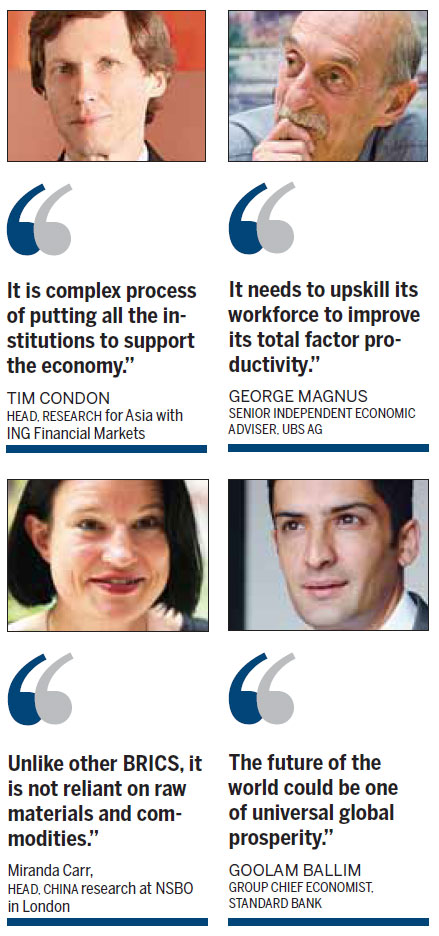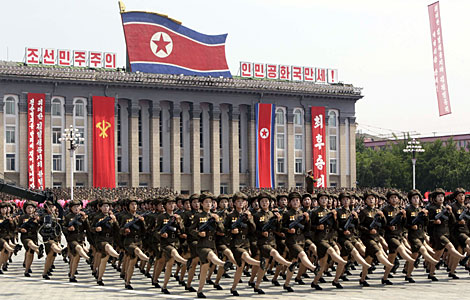Financial guru looks to nation's future
Updated: 2013-07-29 07:18
By Andrew Moody (China Daily)
|
||||||||


What China has to do to avoid the risks of stagnating growth that others suffered
Can China break out of the middle-income trap? Many countries find the move from low- to middle-income status straightforward but discover the next step up is a bridge too far.
In his book, Breakout Nations: In Pursuit of the Next Economic Miracles, which has just been published in Chinese as well as in a paperback edition, Ruchir Sharma, head of emerging market equities at Morgan Stanley and leading economic commentator, makes the case that China alone among the BRICS nations (Brazil, Russia, India, China, and South Africa) will make it to the next stage.
He believes it will be able to move on from its 2012 per capita income level of $6,091, according to the World Bank, to around $20,000 within 15 years, providing a comfortably high income.
He makes the point, however, that it will be easier for China to move up the ladder if it sets its growth targets lower at a more sustainable 5 to 6 percent.
Chasing higher rates of growth through excessive investment in infrastructure, he argues, carries the risk of a bust that could see it behaving like a yo-yo in the middle-income trap like many other countries before it.
He paints a gloomier picture for China's fellow BRICS members. He sees Brazil, despite the opportunity to showcase itself by staging next year's FIFA World Cup and the 2016 Olympics, as indebted without a manufacturing base and likely to remain in the middle-income mire in which it has been stuck for 40 years. Its per capita income was actually down nearly 10 percent on its 2011 level of $12,576 at $11,340 last year.
Russia, he argues, is entirely vulnerable to commodity prices, which are now in decline after soaring over the last decade.
India, he points out, has, unlike China, been slow to urbanize and struggles because the IT revolution has only benefited an elite section of the population. Its per capita income of $1,489, according to the World Bank in 2012, means that it currently just makes it as a low middle-income country.
South Africa, which became a BRICS member only in 2010, has a per capita income higher than China's at $7,508 but, according to Sharma, is on a downward trajectory and may soon be eclipsed by African rival Nigeria as the dominant economy in Africa.
The big question about whether China itself will eventually break through continues to divide economic commentators. George Magnus, senior independent economic adviser to UBS AG, believes that China has the necessary firepower to make it into the top league.
"I think the necessary conditions are being able to build a world-beating, very competitive manufacturing capacity and, second, to be geographically close to or part of global supply chains. For the moment China ticks both boxes and a lot of other emerging markets don't. I don't think that there is much risk that China won't press on up the middle-income league over the next decade," he says.
The author of Uprising: Will Emerging Markets Shape or Shake the World Economy? also says it will still be hard for China to step up to the premier division of high-income nations.
"There are a lot of things that China has achieved spectacularly that you can only do once. You can't join the World Trade Organization twice, you can't keep piggy-backing on a buoyant global economy as China has done and you can't continually transfer labor from low productivity agriculture to high productivity agriculture," he says.
"There are only three things that sustain reasonably high rates of growth, which are labor, capital and what we economists nerdily call total factor productivity, which is about technical progress.
"What China has to do is to improve the quality of its labor, which is essentially about education and making people equipped to make a more effective contribution to offset the physical drag that goes with an ageing and declining working population."
There remain many different definitions of country income status. According to the World Bank, a country moves from low income to low-middle income when it achieves a per capita income of $1,035. It moves into upper-middle income at $4,086 and high income at $12,616.
By this definition Russia has already achieved this at $14,037, according to the World Bank in 2012, but this is a low figure compared with what is generally accepted as being in the high-income league.
To some extent, South Korea shows the way for China on $22,590 as well as the mainland's neighboring economies: Taiwan on $20,200 and the Hong Kong Special Administrative Region on $36,796.
The real aspiration, however, has to be to achieve the income levels of the firmly wealthy countries such as the United States ($49,965), Germany ($41,514), Japan ($46,720) and Singapore, with one of the world's highest per capita incomes at $51,709.
Tim Condon, managing director and head of research for Asia with ING Financial Markets in Singapore, says it is still not clear whether such a vast country as China can ever make it to these heights.
"If you are talking about making it the same sort of level as the United States, European countries such as the UK and Germany, that is much more of a difficult leap," he says.
"If it was just a matter of reading (former Singapore prime minister) Lee Kuan Yew's book (From Third World to First: The Singapore Story) and using it as a manual, every country in the world would be as rich as Singapore. It is a very complex process of putting all the institutions together to support the economy and some countries make it and others don't."
Condon says the one thing going for China is that it has been there before, albeit nearly two centuries ago.
"China was historically in this position and had an empire for several millennia and so history would suggest it has the capacity to be a world leader again," he adds.
Joe Studwell, founding editor of the China Economic Quarterly, argued in his recent book How Asia Works: Success and Failure in the World's Most Dynamic Region that China had provided a solid basis for its economy to step up by making the necessary agricultural reforms 30 years ago unlike other BRICS countries.
"If you ignore that part of the economy - as most developing economies do because they are run by people who live in cities - you have already shot yourself in the foot." He says whether China does make it to the next level and becomes a developed nation could depend on many of the current economic reforms being discussed now.
"China is going through an adjustment process right now and we will know over the next 24 months what sort of policy changes have been adopted."
Many see the reforms the Chinese government aims to make as crucial to the future development of the economy.
These include reforms to the banking sector, interest rate liberalization, reform of State-owned enterprises and also reorganization of healthcare and education.
Zhiwei Zhang, chief economist, China, for Nomura, based in Hong Kong, says it is vital these are carried through.
"I think China's manufacturing sector is already very competitive and it is hard to increase productivity there. But many areas of the economy such as railways, telecoms and the provision of services such as healthcare and education are monopolized and inefficient," he says.
"There has been a slowness in the way structural reforms have been implemented. We hear a lot about policy guidelines but, in terms of concrete action, we haven't seen that much."
Zhang says there is a risk of China being stuck in some form of middle-income trap if it doesn't make progress on these issues.
"I wouldn't say yet that it is on a set path to achieve high-income developed status. There is still quite a lot of uncertainty there," he says.
Charles Gore, former head of research on Africa and least-developed countries for the United Nations Conference on Trade and Development and honorary professor of economics at the University of Glasgow, says it is vital time for policymakers in China.
"I would argue there is a certain commonality to this catch-up process. Whether you get through it or not depends on whether policymakers understand the nature of the problem," he says.
Gore says countries tend to come up to the middle-income trap when their gross national income reaches 30 percent of that of high-income countries.
He cites a World Bank report which states that ratio for China is set to rise from 19 percent in 2005 to 42 percent in 2030.
"China is at the critical point where the easier phase of structural transformation comes to an end and they just can't make the jump to the next stage," he adds.
Bala Ramasamy, professor of economics at the China Europe International Business School in Shanghai, believes that Chinese policymakers do have the ability to think on their feet, which in the end is likely to mean they come up with the right innovative policies to escape the middle-income trap.
"China has been able to demonstrate every decade or so that it can. The recent announcement of making Shanghai a free trade zone was pretty typical of that. I think this is actually interesting and important," he says.
Most commentators - as well as Sharma - agree that China's prospects are not aligned to those of the other BRICS countries although theirs might be with China.
Certainly, China's slowing growth has affected commodity exporting countries Brazil, Russia and South Africa.
Goolam Ballim, group chief economist at Standard Bank, based in Johannesburg, says the last decade was very much the era of the BRICS.
"The noughties were the BRICS decade but the subsequent decades are going to be much more difficult for them.
"Their growth came from the fact they were infant, underdeveloped markets that were previously closed. They were primary sector dominated so they had huge capacity to grow by giving life to secondary and tertiary sectors."
Ballim says the biggest impact of BRICS has been in Africa itself. "Twenty years ago, only 1 percent of Africa's global trade was with BRICS countries. This has risen to 20 percent with China about two-thirds of that. China's trade with Africa has increased 16 times over the past 15 years which is actually quite breathtaking," he says.
Magnus at UBS also believes the BRICS story is also now probably over.
"If you are basically looking for the next 8 to 10 percent growth story then my advice would be to look elsewhere. These guys have just had 10 years plus of extraordinary high growth rates. I think Sharma is absolutely correct in his judgment," he says.
With the development of the BRICS nations in the last decade, the idea took hold that the world was moving to a position where every country in the world would one day be developed and have high incomes with perhaps Africa being the last frontier.
andrewmoody@chinadaily.com.cn
(China Daily USA 07/29/2013 page13)
Most Viewed
Editor's Picks

|

|

|

|

|

|
Today's Top News
Experts advise CEOs on how to make it in the US
Israeli-Palestinian peace talks to resume
Latest US-China talks should smooth the way
Audit targets local government debt
30 people killed in Italy coach accident
Brain drain may be world's worst
Industry cuts cloth to measure up to buyers' needs
Reckless projects undermine the prosperity hopes
US Weekly

|

|















